What to Do in Nuremberg: 11 Honest Highlights from Castles to Courtrooms

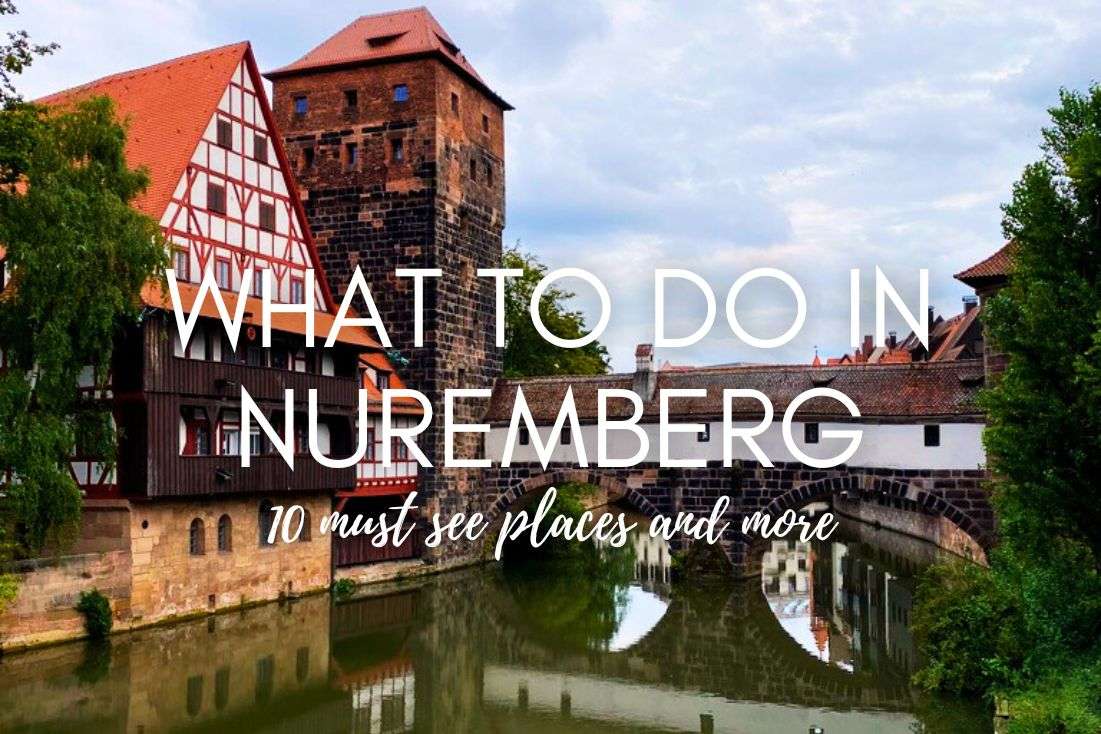
Nuremberg is a city of rich history, kings and emperors, Nazi rallies, protestants, arts, Bratwurst, and a famous Christmas Market. But what can you actually do in Nuremberg?
I have been several times now, and I can confidently say these are the very best spots to visit in Nuremberg based on my own experience—no tourist traps or overrated garbage. They’ll get you the most comprehensive sightseeing, history, atmosphere, and fun.
Quick list: What to do in Nuremberg?
- Step inside Albrecht Dürer’s house
- Climb up to Nuremberg Castle
- Confront history at the Nazi Party Rally Grounds
- Ride through railway history at the DB Museum
- Dive into culture at the Germanisches Nationalmuseum
- Watch the clock at Frauenkirche
- Explore the heart of the city at Hauptmarkt
- Admire the gothic scale of St. Lorenz Church (+ quick stop at St. Sebald)
- Get a taste of old craftsmanship at Handwerkerhof
- Reflect at the Nuremberg Trials Memorial
- Act like a kid at the Toy Museum (or not)
Sometimes, all you need to do is take the first step... I've filtered out the best hotels in Nuremberg for you
Save it for yourself to come back to later, or share with your friends on social media!
I've already planned your ititnerary for the trip, complete with my travel tips.
What’s Nuremberg like?
Head to the Old Town—it’s walkable, dominated by its hilltop castle, and enclosed by a ring of medieval walls. It’s historical but still feels lived-in and real without being overly commercialized. You’ll see gothic churches, cobblestone streets, and half-timbered houses… along with the occasional Starbucks and H&M.
The Pegnitz River divides the Old Town into two halves. Most tourists end up around the castle, Hauptmarkt, and Albrecht Dürer’s house, but there’s just as much to see across the bridges—like St. Lorenz, Handwerkerhof, and a few quieter photo spots.
Most of the top sights are packed inside the city walls. The main train station is just outside the walls to the southeast. From there, it’s a 5-minute walk through the Königstor gate into the Old Town. Most attractions like the Germanic National Museum, Toy Museum, DB Railway Museum, and major churches are within walking distance.
For heavier WWII history—an unmissable part of Nuremberg if you want to experience the city properly—like the Nazi Rally Grounds or the Nuremberg Trials Memorial, are outside the walls but still within the city.
I have written another article where I’ve put together a full itinerary for one day in Nuremberg that includes most of the top things to do in Nuremberg on this list. It’s complete with walking/driving distances and time spent at each spot, so check it out if you’re ready to visit Nuremberg on your own.
Map of Nuremberg: Top things to do
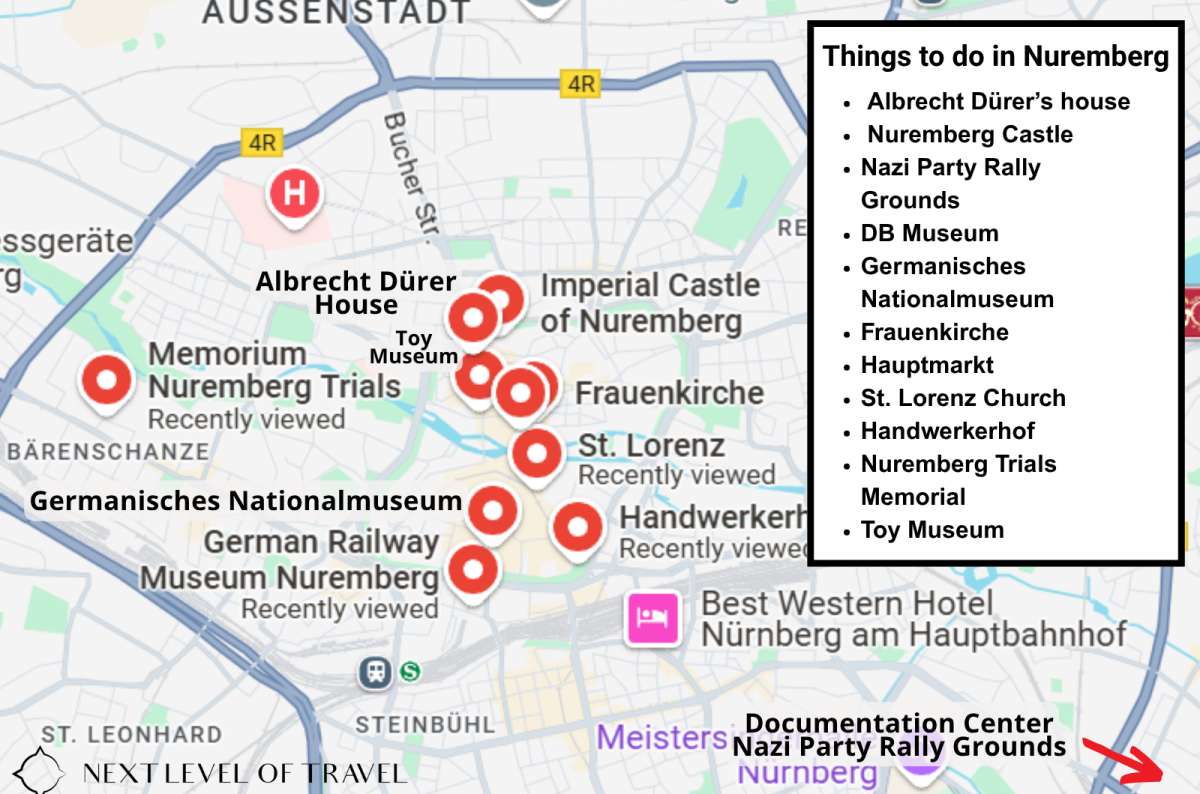
From castles to courtrooms and toy trains to trials—Nuremberg packs a lot into one historic city
Who is Nuremberg for?
If you're the kind of traveler who actually wants to learn something and is at least a little interested in history, Nuremberg’s for you. You’ll like it if you're into museums, old buildings, and Nazi and war crime stories. Families will enjoy the Toy Museum or the trains, for sure.
Pro tip: If you want to see more of Bavaria beyond Nuremberg—like Eagle’s Nest, Berchtesgaden, Neuschwanstein, and some gorgeous hiking trails—check out my 7-day Bavaria itinerary. It’s a solid mix of history, nature, and adventure.

1. Step inside Albrecht Dürer’s house—a definite must-see place in Nuremberg
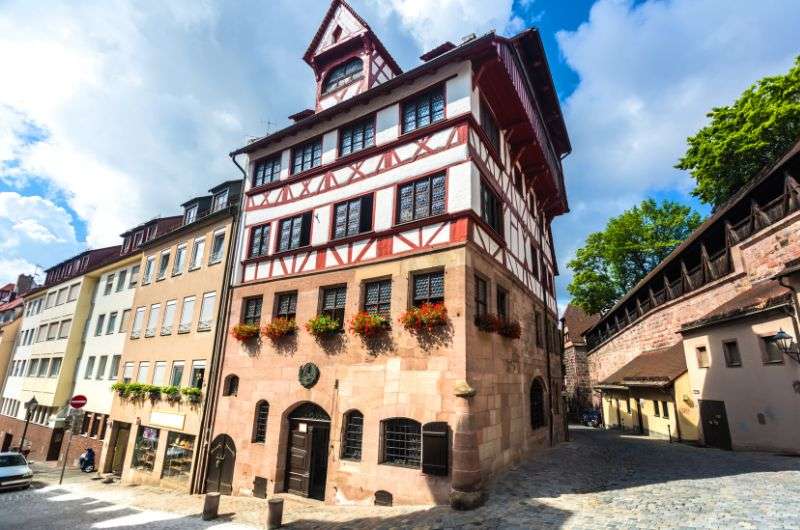
Albrecht Dürer’s house
- Opening hours:
- 10 am to 5 pm (Tuesday to Friday)
- 10 to 6 pm (weekends)
- Tickets: EUR 6
This is the number one to see in Nuremberg. The Albrecht Dürer’s House is located right next to the castle in the beautiful half-timbered house. The house itself was built in 1420 and it was Dürer’s residence from 1509 until his death in 1528. When you visit, you really feel like you’re visiting his home, sort of like he stepped out for a bit and never returned.
There are incredible five stories inside the house, so it makes sense that it’s not just full of paintings (however impressive they are). I especially appreciated the reproduction of the Dürer’s studio workshop and living quarters completed with the story of his life. There are even special guided tours by the Dürer’s wife Agnes (ehm, an actress impersonating Agnes of course). Sure, it’s a little cheesy, but it can be fun if you embrace it.
Fun fact: Albrecht Dürer was one of the first artists to treat his work like a brand—he even used a signature monogram—basically a logo for his paintings. He was famous across Europe during his lifetime, which was rare back then unless you were royalty or a pope.
2. Climb up to Nuremberg castle
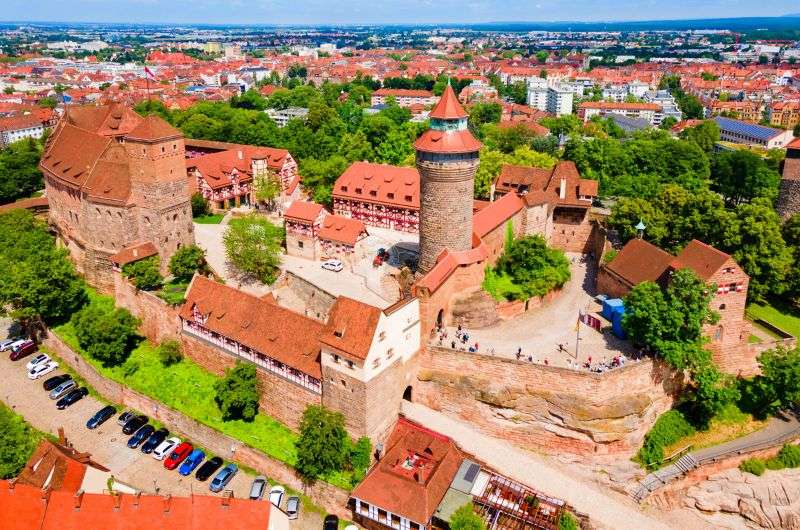
Nuremberg castle
- Opening hours:
- April to September: daily 9 am to 6 pm
- October to March: daily 10 am to 4 pm
- Tickets: For EUR 4, you can get a ticket to the Deep Well and Sinwell Tower, or grab a combination ticket that includes Palas with double chapel as well for EUR 9
- Jan’s tip: If you're short on time (or interest), you can skip the interiors and focus on the exteriors, garden, walls, and just pay EUR 4 for the well and tower.
Inside Nuremberg’s the impressive medieval town walls resides the Imperial Castle of Nuremberg or simply Nürnberger Kaiserburg in German. You can’t visit Nuremberg without going to the castle, it’s one of the best places to visit in Nuremberg for good reason (with the nicest views, too).
The history of the castle dates back to 1050 and throughout the Middle Ages, it was one of the most important sites of the Holy Roman Empire. It comprises several buildings, the Imperial castle being just one of them, and together with the city walls, it belongs among the grandest medieval fortifications in Europe.

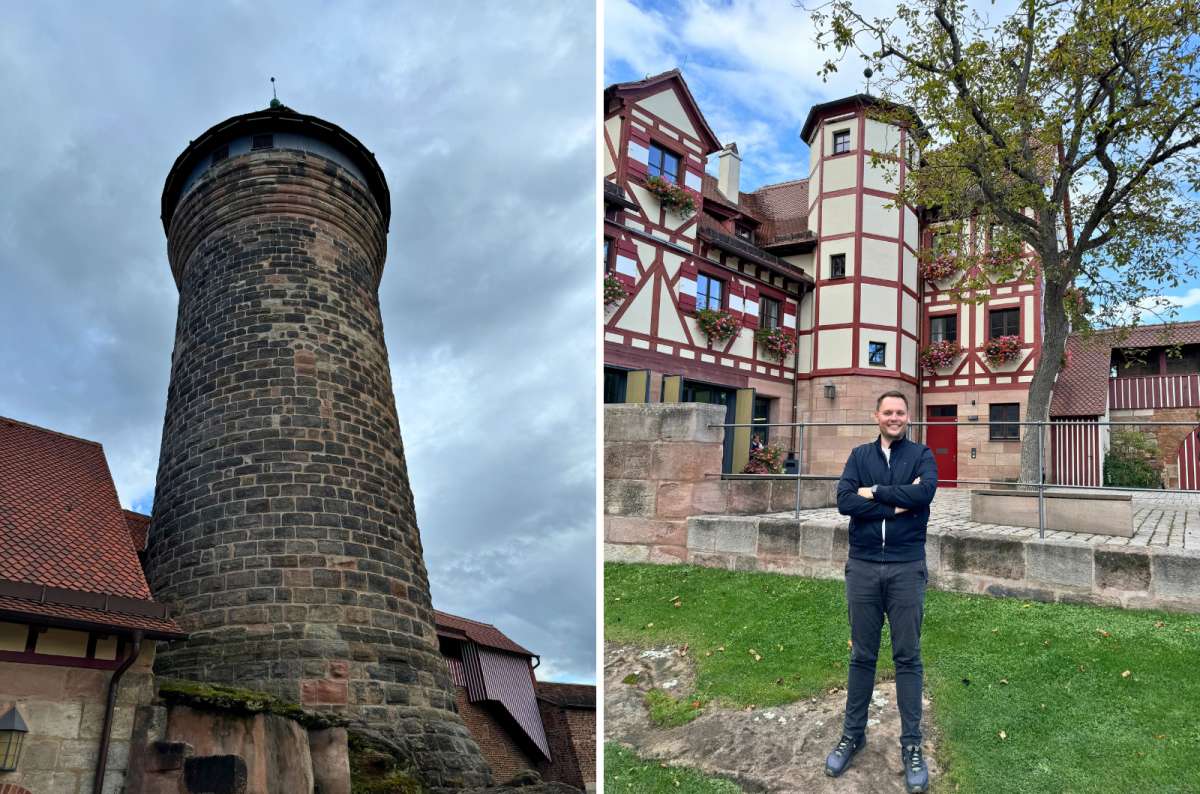
The medieval version of a penthouse with a view
Start with the exteriors
Pro tip: You can walk along the castle walls, which is a nice elevated way to see the area.
From the outside, the castle is very impressive, way more than the inside, to be honest. The castle complex includes timber-framed buildings (called Fachwerkhäuser), an architectural bonus that make Nuremberg’s Old Town so visually pleasing.
You can also visit the Sinwell Tower, which obviously isn’t original but offers panoramic views over Nuremberg’s spiky rooftops. It’s a different architectural vibe than places like Prague—sharper, more vertical, and definitely cool.
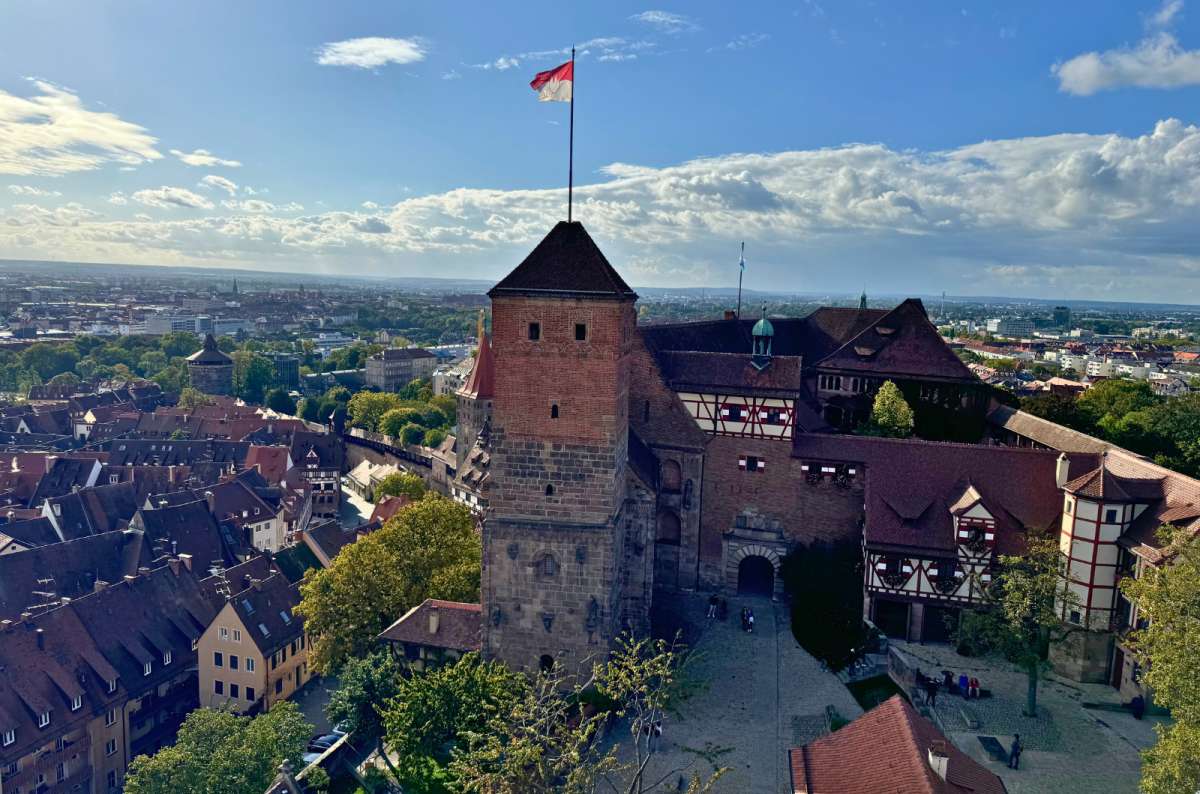
The castle was heavily damaged during World War II bombings but was meticulously reconstructed in the years that followed.
What to expect inside
When we got inside, I was a bit disappointed as there’s not really that much to see and there is basically no information in English (your only option is to pay extra for an audio guide). However, we admired the medieval architecture, which is definitely worth seeing and you don’t need any translation for that.
That said, some parts are worth the few extra euros. I particularly enjoyed the Deep Well tour which runs every hour, lasts about 15 minutes, and includes a short explanation in English (finally).
The well is 49 m (160 ft) deep. They do a fun demonstration of the depth by dropping a candle into the well so you can see how far down it really goes—fun, right? They even explain how the water is 800 years old, and that the well used to be a closely guarded secret.
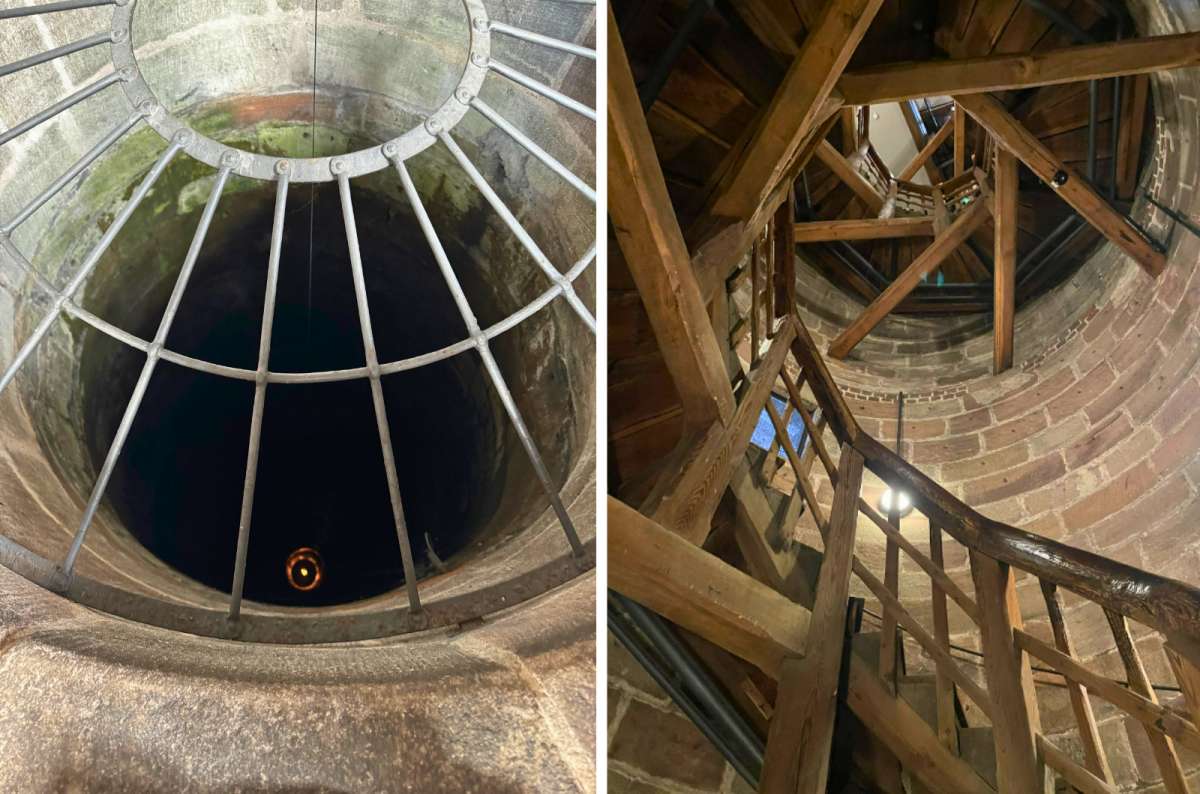
Don’t worry, Samara’s stuck at the bottom
Fun fact: From the freezing air at the bottom of the well chamber to the potentially blazing temps at the top of the tower, you’ll go from -50°C to +50°C (-58°F to 122°F) in 10 minutes flat! Ok, you won’t go to the very bottom of the well, obviously, but hypothetically you could. Castle gardens and extra views
Apart from the Palas with Double Chapel and Imperial Castle Museum, there are beautiful Castle Gardens, which are freely accessible. We had a little trouble finding them, because they're hidden behind the castle complex. But if you try a little, you’ll be rewarded with a peaceful place and magnificent views of the city.
3. Confront history at the Nuremberg Nazi Rally Party Grounds—one of the most chilling places in Nuremberg
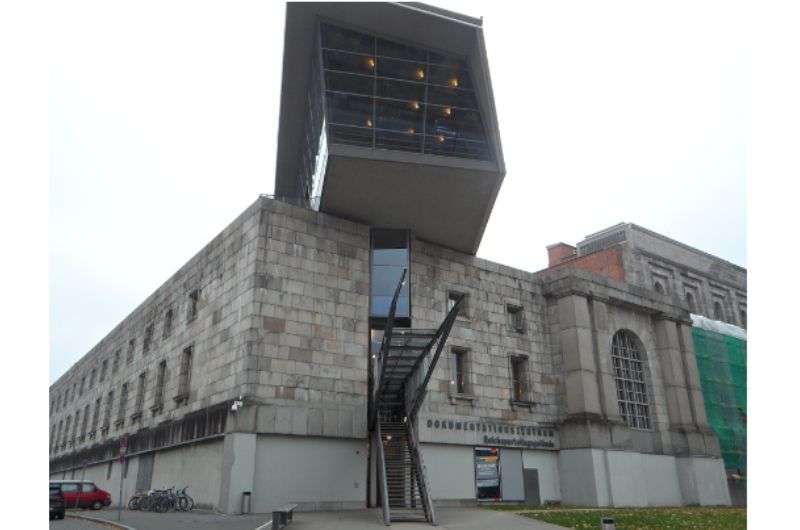
Architecture that literally cuts through Nazi megalomania
- Opening hours: daily 10 am–6 pm
- Tickets: EUR 7.50, parking costs EUR 5
- Jan’s tip: For photos, head behind the lake where the wide parade road is—it’s the best place to take a clear shot of the building.
A well-rounded visit to this city has to include some of the Nazi-related places to see in Nuremberg. The Documentation Center Nazi Party Rally Grounds marks arguably the darkest time of the city history.
Nazis chose Nuremberg as their headquarters for the massive propaganda rallies even before they came to power in 1933. Mainly because Nuremberg lies in a perfect location, almost in the center of the whole German-speaking area of Europe.
The whole site stretches on over 11 square kilometers (4.3 square miles) which witnessed six Nazi party rallies in between 1933 and 1938. It’s absolutely monstrous—not surprising, since up to 1 million idiots, err, I mean, people, attended the annual meetings.
I could totally picture how this thing intimidated the crowds—also by design, or course. Visiting this place in Nuremberg now while keeping in mind the political shitstorm of today’s time is honestly sobering.
The exhibition called Fascination and Terror provides the original building plans, photos, interviews with eyewitnesses, official documents and much more. It’s an impressive place, me and Karin got chills just standing there.
But also, an important monument explaining the reality of the Nazi regime and most importantly its origins, which need to be reminded.
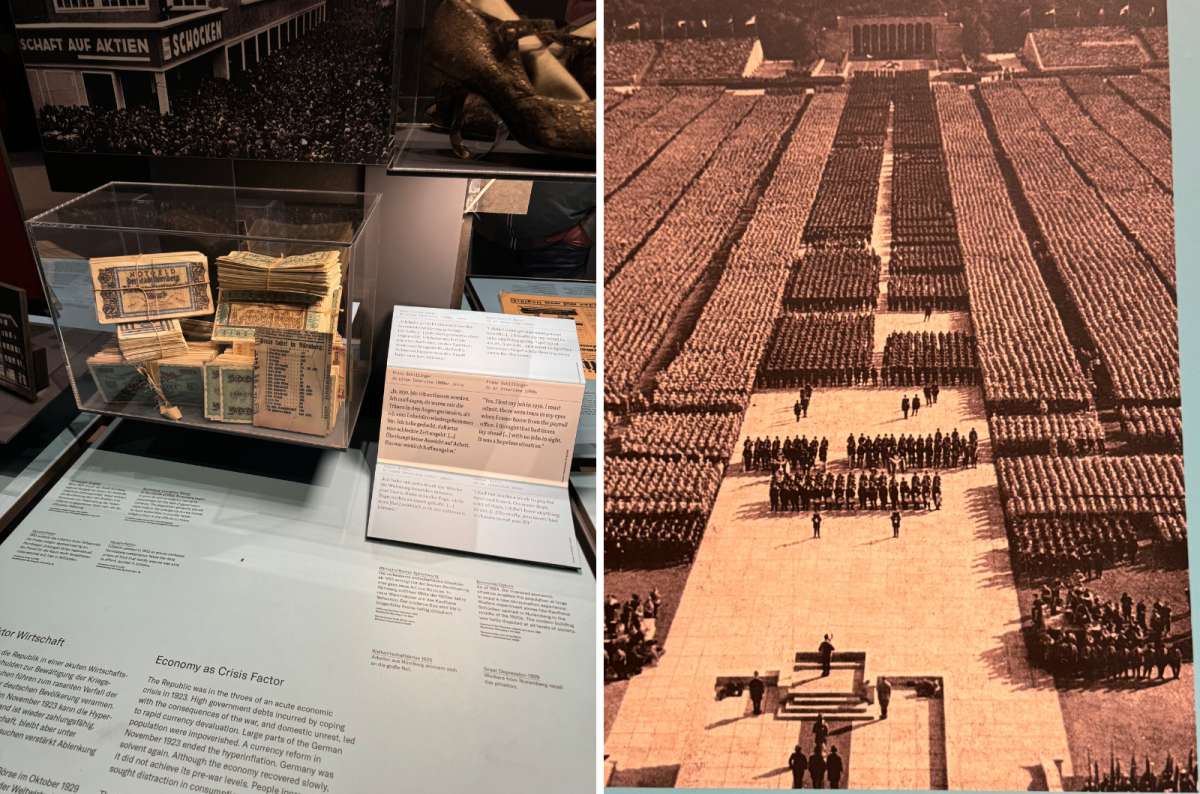
Stacks of worthless cash and rows of obedient crowds—two symptoms of a broken republic
The permanent exhibition is closed in 2025
Unfortunately, during my last visit in 2025, parts of the building were under reconstruction, including the permanent exhibition, which is closed at least until the end of the year.
The inside of the congress hall was surprisingly empty—no windows, no real features—just an enormous hollow shell. It’s the outside that really impresses.
There’s a lot of disturbing detail in the museum. You’ll see the stories of leading Nazi figures and how their lives ended, the roots of antisemitic propaganda, and even the hyperinflation that wrecked Germany’s economy—notice the five-million-mark banknotes!
Another not-so-fun fact is that many of the materials used to build this place came from concentration camp labor. In 1939, the building is where they kept prisoners of war… and, in a strange twist of history, then became a celebration site for the US Army, who handed out Medals of Honor there.
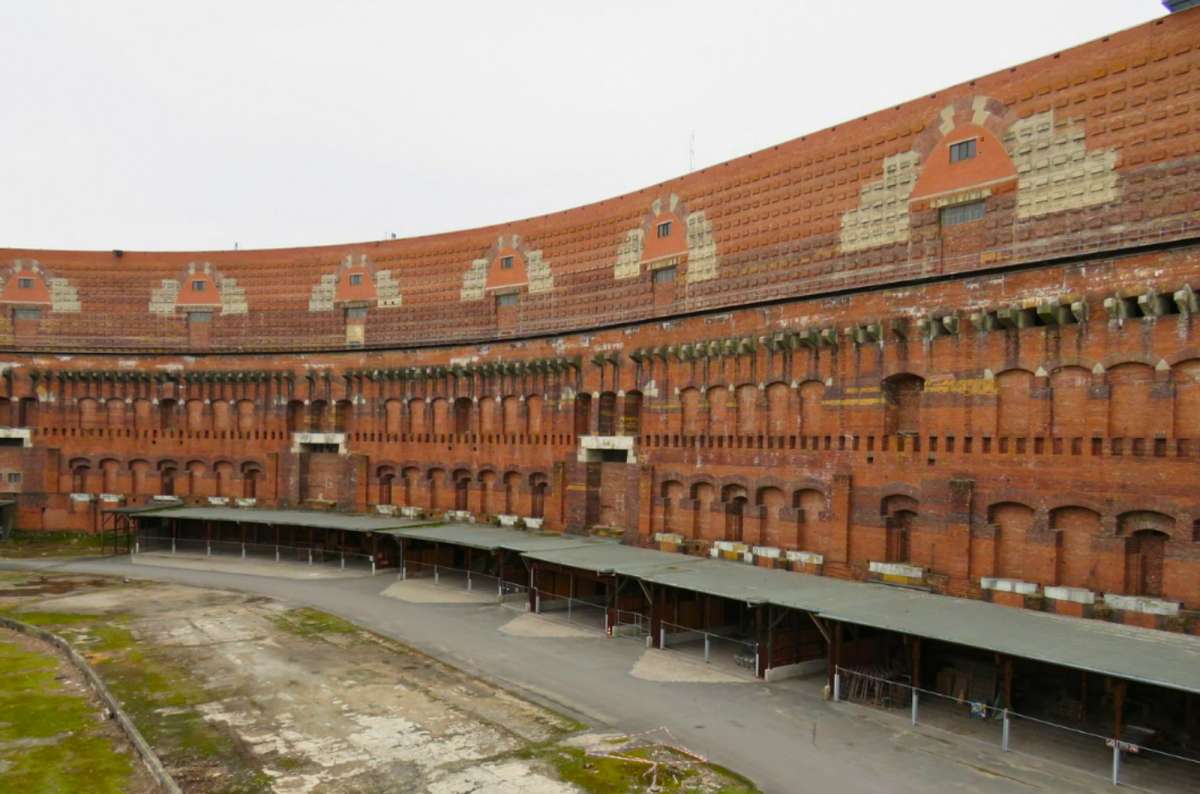
The Congress Hall was designed to hold 50,000 people in celebration of dictatorship—today, it holds silence, scars, and stories
Practical details: How to plan your visit
Just put “Nazi Party Rally” into your GPS and it’ll lead you straight to the parking gate. Parking costs EUR 5, and there aren’t that many spots, so get there early if you can.
There are two entrances—one to the museum, one to the rally grounds—but both are included in one ticket, so you can start at either.
“Fun” fact: The entrance to the building looks strangely similar to Auschwitz… unsettling!
Don’t expect much in terms of English signage. My German isn’t strong, so I used my trusty translation app the whole time.
Oh, and one final note: Zeppelin Field’s nearby but skippable if your time in Nuremberg is tight. It basically looks like nobody’s known what to do with it since the war ended.
4. Ride through railway history at the DB Museum (German Railway Museum)
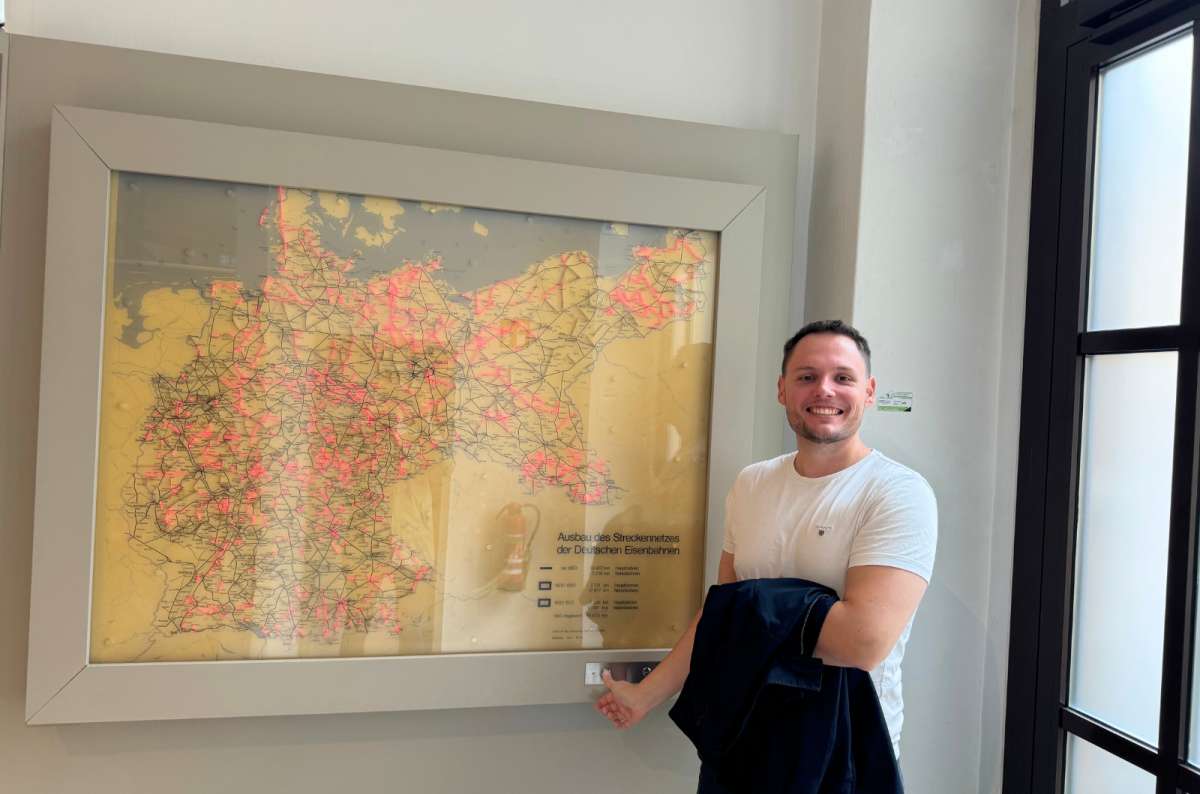
Train nerd level: unlocked
- Opening hours:
- 9:00 am to 5:00 pm (Tuesday to Friday)
- 10:00 am to 6:00 pm (Saturday, Sunday & holidays)
- Tickets: EUR 9
- Jan’s tip: Start on the 2nd floor to see the best bits first and then decide how much energy you have left for the rest. And if you like life-size trains, head across the street to Hall 2, too.
The DB Museum in Nuremberg is owned by Deutsche Bahn, Germany’s national railway company, which means they have both the money and the motive to make it decent—and they actually did.
Practical info and what to expect
You can run through the museum in 1.5 hours, but if you’re visiting with kids or trainophiles, this visit will take a while. Like 3 hours+, easy.
Pro tip: If you’re short on energy or time, start from the second floor—it’s more engaging than the first and definitely worth seeing while you’re still alert.
The German Railway Museum is focused entirely on the history of rail transport in Germany, starting all the way back in 1835, when the first German railway ran between Nuremberg and Fürth. By 1845, Germany’s rail network was already massive for its time.
Entry is cheap (EUR 9), and parking is easy in the streets close to the museum. On weekends, it’s even free, which feels almost suspiciously generous by German standards. It took me a good minute to stop searching for a parking meter that wanted to take my money.
What you’ll see inside
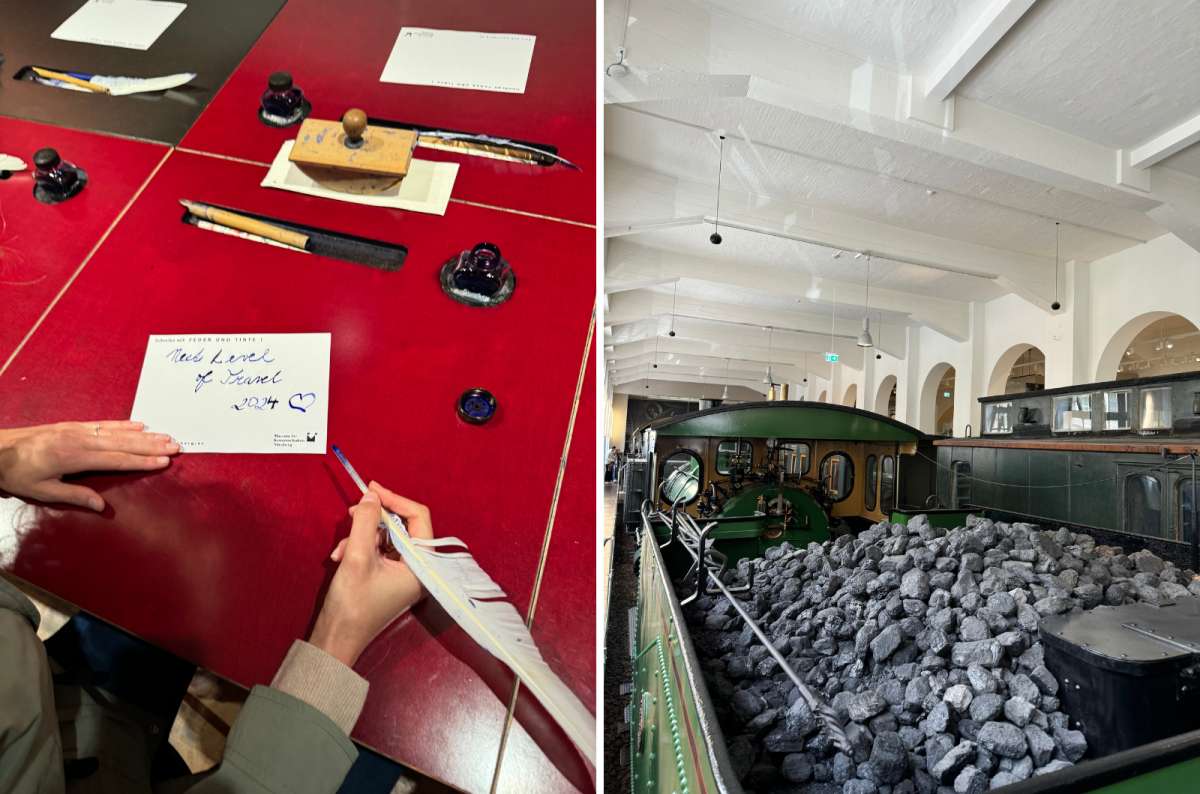
Writing with a quill by hand… right next to a train that once ran on coal. Time travel, museum edition
Like any self-respecting museum, it starts with a timeline. The main exhibition is on 3 floors, it’s all very modern and interesting, and there are plenty of full-size trains on display. Descriptions are mostly in German, so this is another place where you’ll make use of Uncle Google. Oddly, English descriptions only start appearing on the upper floors. No idea why.
If you want to see more life-size trains, head across the street to Hall 2! It’s indoor/outdoor. We arrived 15 minutes before closing time and the museum man was very unhappy we made him wait until the end of his shift and made it clear he wants us to leave asap.
What I liked most
Overall, I found it interesting to learn how trains changed Germany. For example, thanks to trains, conflicts got heated faster, because faster mobilization meant less time to cool down when someone pi$$ed someone else off.
There’s also a decent section on the steam engine itself, explained well enough for a total beginner. And just in case, like me, you are wondering if that pile of coal is real—yes, yes it is. My black fingers were proof.
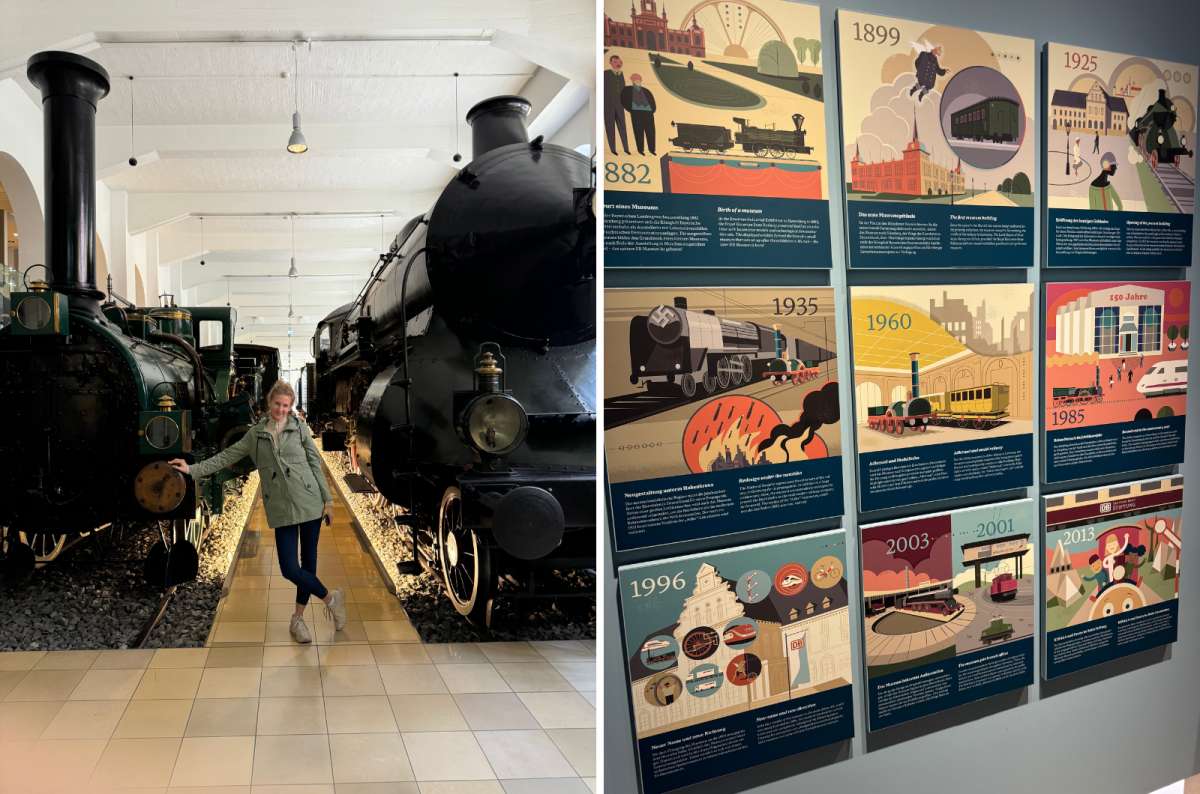
Where history runs on steam—and staff patience runs out at 5 pm sharp
You’ll also see a huge model train display that’s one of the most popular parts of the museum.
The fanciest of all the carriages on display is hands down the Otto von Bismarck carriage—an ornate piece of history. Needless to say, the speed may have gone up, but the comfort on DB trains has gone considerably downhill since those days!
Pro tip: If you have a special interest in train toilets, you’ll also find those on the second floor. Yes, really.
5. Dive into centuries of culture at the Germanisches National Museum—one of the best museums in Nuremberg
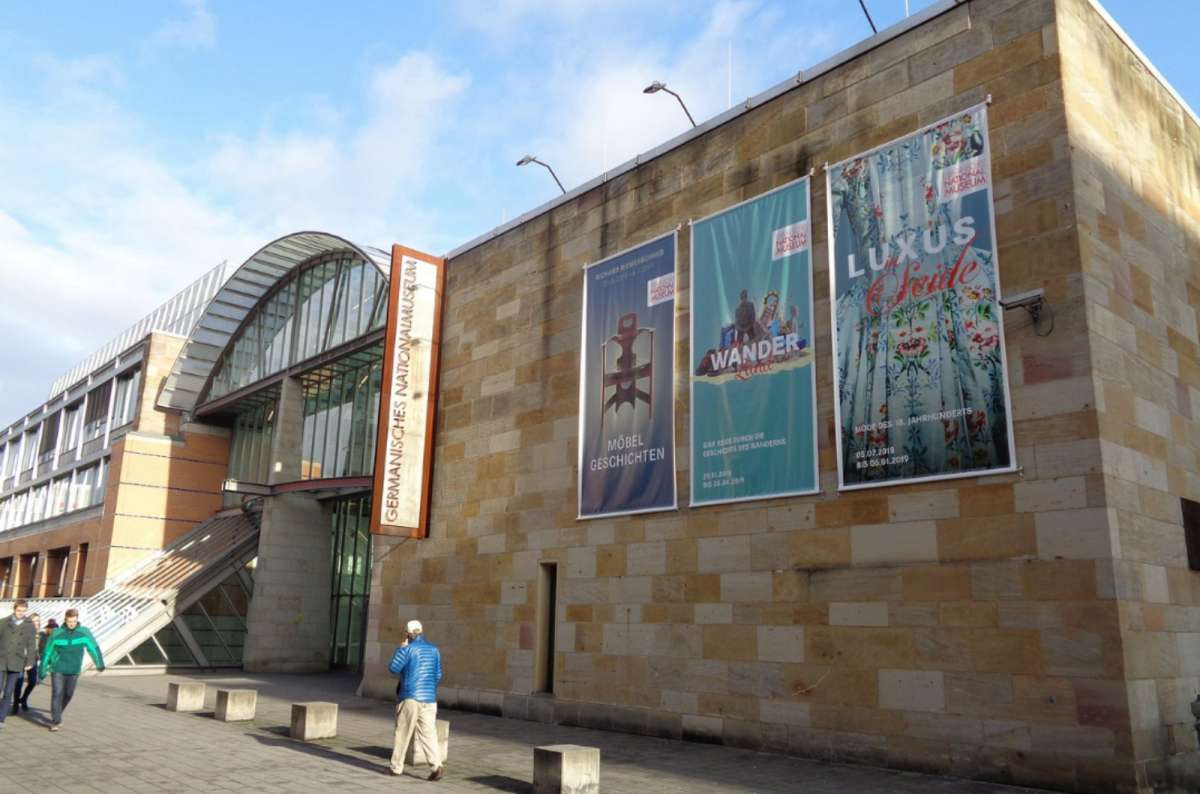
The entrance of the Germanisches Nationalmuseum
- Opening hours: 10 am to 6 pm (Tuesday–Sunday), and 10 am to 8:30 pm (Wednesday)
- Tickets: EUR 10
- 2025 update: Part of the museum is still under renovation, so not all sections are open—it may be worth checking your favorites are available before heading in so you’re not disappointed.
I had a blast exploring the Germanisches Nationalmuseum—the largest museum of cultural history in the German-speaking world. Sounds big, right? Well, it is. It exhibits about 25,000 objects at any given time, which is just a fraction of the 1.3 million total it holds!
Too bad everything is in German there. I won’t lie, that was a big disappointment for me. The only option is to rent an audio guide or use a translator app, which is pretty annoying, especially if you’re interested in covering a lot of ground.
What to expect inside?
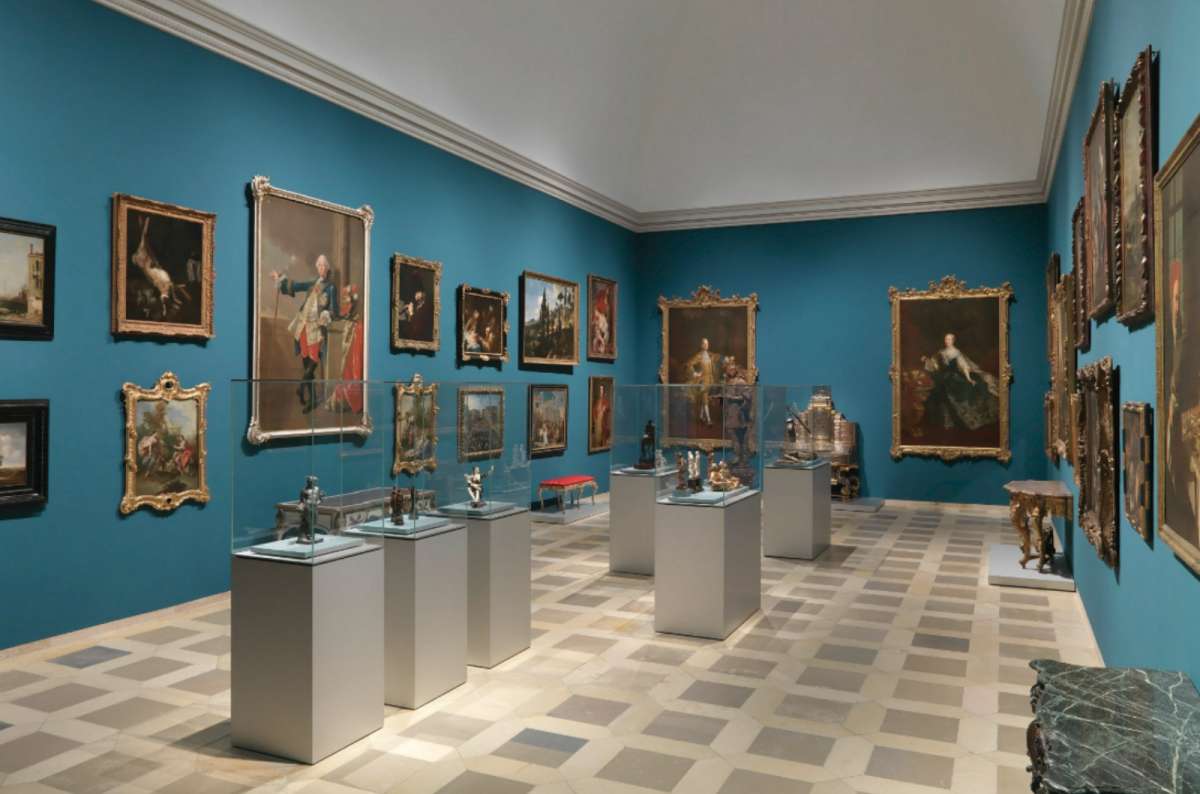
These baroque beauties weren’t just for show—portraits like these were basically 18th-century PR @ Germanisches Nationalmuseum
Everything! Or a less overwhelming way to put that—something for everyone. I’m talking medieval armor, paintings, altarpieces, scientific and musical instruments, fashion, and even toys.
Being the picky tourist I am, I found some rooms fascinating, while others gave more “storage” vibes and I just quickly passed through. There are some real treasures, too, for example, the oldest surviving globe from 1492! Fun fact: They had completed the globe just a few weeks before the word of the discovery of America reached Nuremberg, so it’s not portrayed on the globe… bummer.
Truthfully, it’s a bit of a maze, spread across 4 floors, though most of it’s on the first two. I don’t think anyone goes through this museum stopping at every single artifact unless they have all day, and nobody but the locals have that kind of time. You’ll need to pick your battles or risk burning out before you even hit the Renaissance.
Pro tip: If you only have a day in Nuremberg, you’ll find the audio guide that takes you through the museum’s highlights in 60 minutes very useful.
If you're visiting in summer 2025, I recommend the temporary exhibition called “Connected Worlds”. It’s one of the more relatable parts of the whole museum. It looks at how global everything has been for centuries—jeans next to 18th-century silk, a GPS next to a medieval astrolabe, that kind of thing.
6. Watch the clock strike noon at Frauenkirche
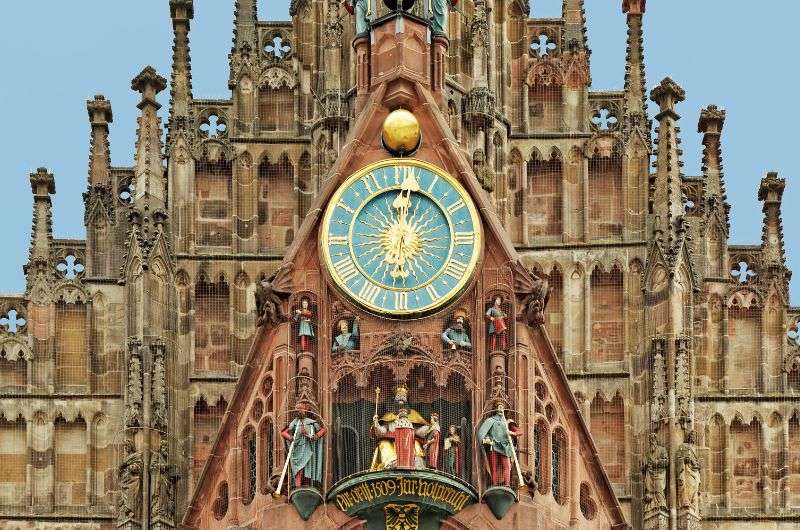
Frauenkirche
Right at the Hauptmarkt stands a marvelous 14th century Frauenkirche (The Church of Our Lady). Don’t worry, you can’t miss it unless you’re completely blind. The building has dominated the square since 1362, when it was finished. Emperor Charles IV had it built for imperial ceremonies, as reflected in the rich gothic decoration, including the coats of arms of the Holy Roman Empire, the seven Electors, the town of Nuremberg and the city of Rome.
The central piece of the west facade is the Männleinlaufen—the old clock commemorating Charles IV’s Golden Bull. It portrays Emperor Charles IV sitting in the center of the clock surrounded by the seven Electors. If you postpone your lunch and arrive there by midday, you can hear the clock bells and see the Electors running around the Emperor.
7. Explore Hauptmarkt—the main square and top attraction in Nuremberg
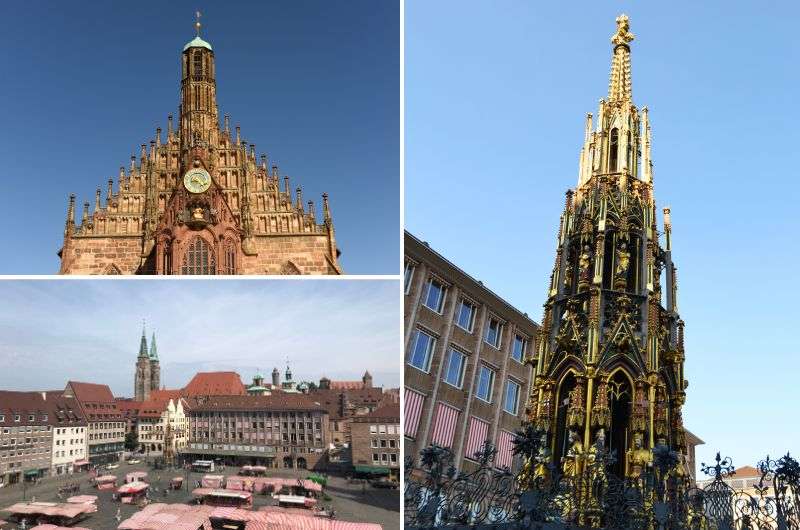
Hauptmarkt
Jan’s tips: Wander away from Hauptmarkt. Don’t miss Weissgerbergasse, a short walk away and one of the most photogenic streets in Nuremberg (more timber-framed houses, anyone?). Cross the Pegnitz River and explore both sides of the Old Town. You can also see Ehekarussell Fountain, and just around the corner is Henkersteg, a beautiful historic wooden bridge worth 5 minutes of your time.
Just a few steps from the Nuremberg Castle lies the Old Town’s heart—the Hauptmarkt (Main Market). Stroll through the centuries-old daily market and admire the medieval architecture, including the 14th century Schöner Brunnen (Beautiful Fountain). The 19-meter-high fountain is designed to resemble a gothic church and the Holy Roman Empire’s values.
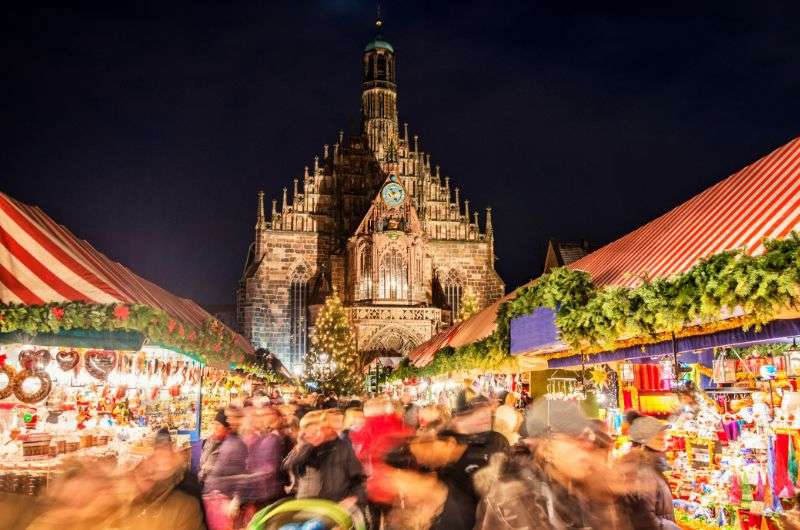
Christmas Market
Tip: Nuremberg Christmas Market
The Hauptmarkt is a site of the renowned annual Christmas Market. During the two-week festivities, there are more than a million visitors from the whole world. It can get pretty crowded there, but it’s worth visiting for Christmas lovers as the magical atmosphere of the Old Town turns into a winter wonderland.
8. Admire the gothic scale of St. Lorenz Church (+ quick stop at St. Sebald)
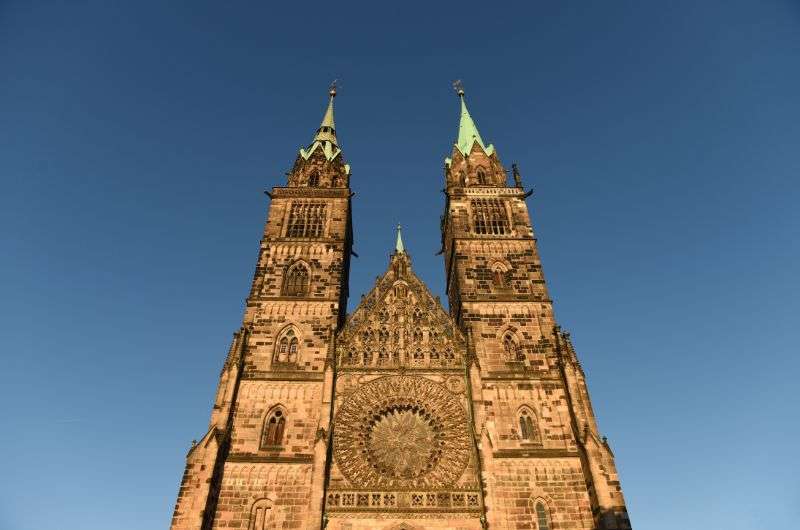
Lorenzkirche or St. Lorenz Church
- Opening hours: 9.00 am – 5.30 pm (Monday–Saturday), and 1.00 pm – 3.30 pm (Sunday)
- Free entry, EUR 2 suggested donation
- Jan’s tip: Make sure to check if there are any concerts or masses at the time of your visit which could limit tourist entry.
The Church of St. Lorenz (Lorenzkirche) is the biggest church in Nuremberg with majestic twin towers and 9-meter-tall (30 ft) rose windows. It houses one of the largest organs in organs in a Protestant church in Germany, with over 12,000 pipes.
St. Lorenz Church is in fact a protestant church (as well as St. Sebald Church) in the otherwise catholic Bavaria. The explanation is easy, Nuremberg was the first German city to become protestant during the Reformation in the early 16th century.
Entry is free, with a suggested donation of EUR 2. After visiting some of the uber-decorated cathedrals in Spain, Lorenzkirche felt visually underwhelming to me—classic German Gothic (aka Boring Gothic).
Pro tip: Don’t skip the nearby Kreuzigungshof (Crucifixion Courtyard). It’s quiet and photogenic, which is a nice change from inside the church and Old Town in general.
Bonus: St. Sebald Church
If you’re already in church mode, stop by St. Sebald Church too. It’s just a few minutes across the river, also Protestant, and free to enter. It’s a quick visit—10 minutes max—but worth it just to see the tomb supported by snails. It's oddly memorable.
9. Get a taste of old craftsmanship at Handwerkerhof
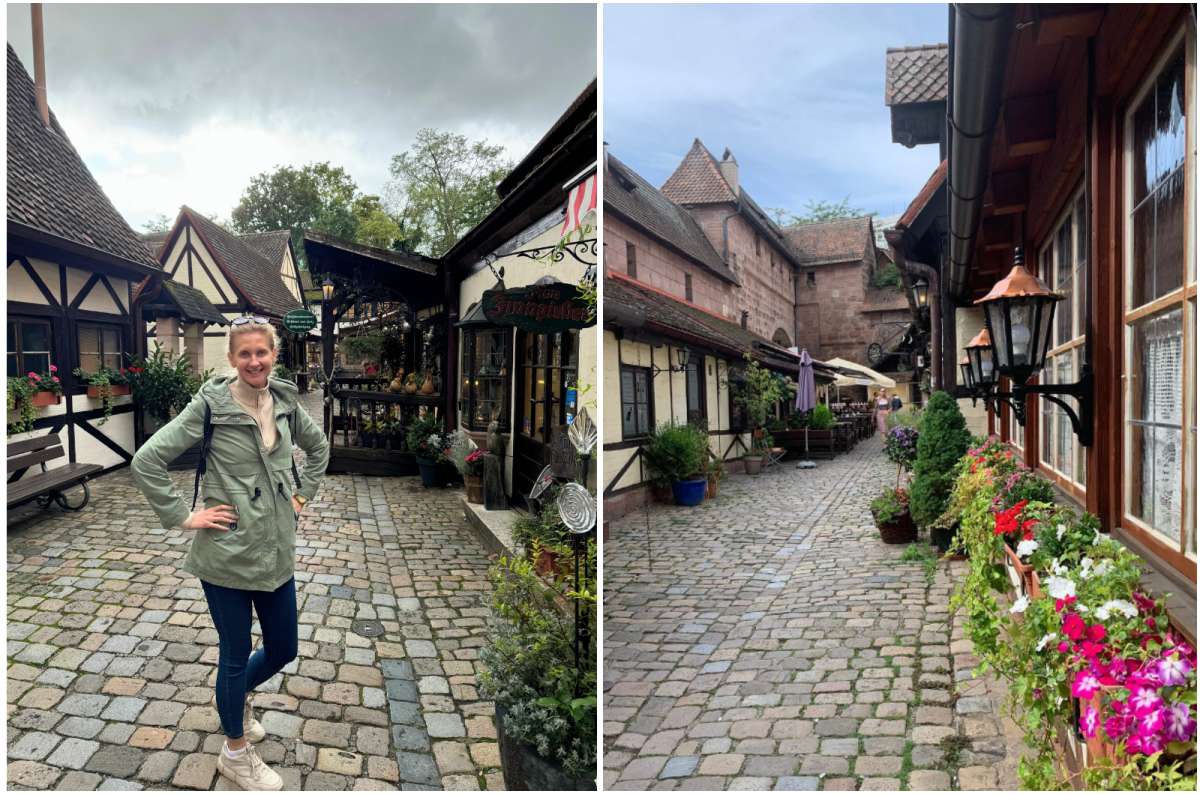
Handwerkerhof: yes, it’s as cute as it looks
- Opening hours:
- Gates open daily from Monday to Saturday from 8 am to 10 pm and Sunday from 8 am to 8 pm
- All shops are open from Monday to Saturday 11 am to 6 pm
- Free entry
Handwerkerhof is a (pretend) medieval marketplace full of handicraft shops, taverns and restaurants in the in the Old Town, right by the Königstor (King’s Gate) and the main train station.
Good for shopping for souvenirs such as handmade jewelry, toys and leather goods. After a souvenir hunt for your friend and family, enjoy a pint of a good German beer, traditional Bratwurst (but you can also just stick to coffee).
Spoiler: The village is not original. Although it looks medieval, it was actually rebuilt in 1971. After World War II, Nuremberg was in ruins due to bombing in 1945, so the entire historic town center needed to be rebuilt.
I was expecting it to be bigger, but it’s still a nice little tourist attraction. Sort of like one of those Disneyland villages—cute.

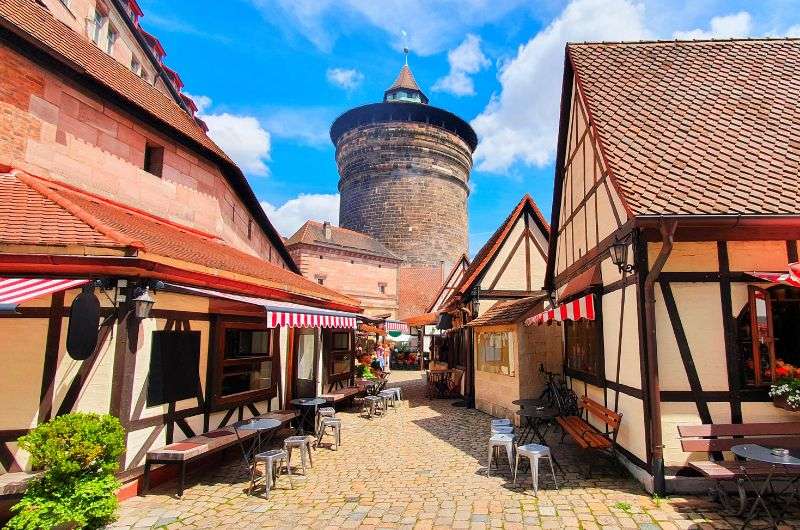
Handwerkerhof
10. Reflect at the Nuremberg Trials Memorial—essential WWII history
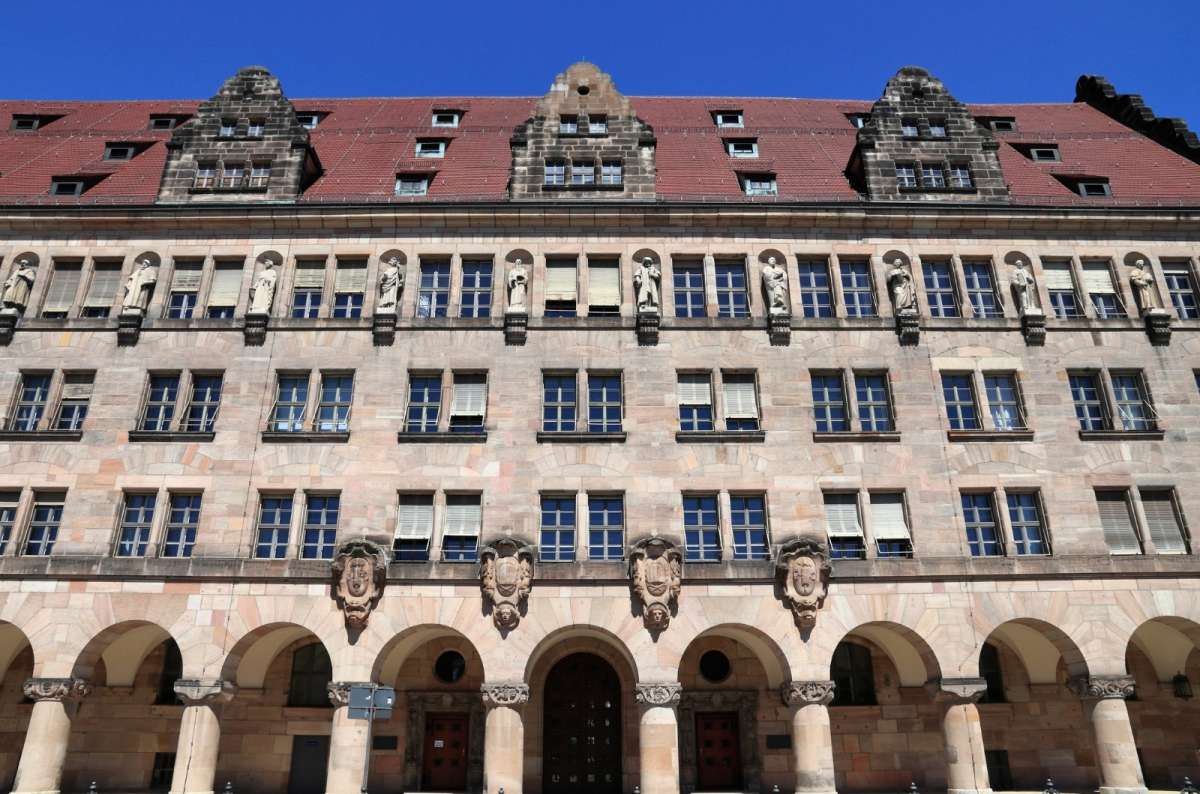
The Palace of Justice (Justizpalast) where the Nuremberg Trials were held
- Opening Hours
- 10.00 am to 6.00 pm (Wednesday to Monday)
- Closed on Tuesday
- Tickets:
- Adults: EUR 7.50
- Jan’t tip: Courtroom 600 is still in use today, so depending on the court’s schedule, you might see it as it looked during the trials, or you might just see it behind glass.
Get ready for another dark place to see in Nuremberg... You’ve probably heard of the Nuremberg Trials, but standing in Courtroom 600, where the top Nazi leaders were actually tried, is a different experience. But it’s not dramatic or theatrical—it’s quiet and unsettling. I think visiting “attractions” like this keeps history in perspective, because sometimes people tend to forget and play down the horrors of the past.
The famous Nuremberg Trials took place in the Nuremberg Palace of Justice where justice resides to these days. The famous courtroom is still in use today, so you may or may not be able to step inside when you visit, depending on the court schedule.
Did you know? The Nuremberg Trials were where the top Nazi brass finally had to answer for their war crimes. We’re talking the worst of the worst: Hermann Göring (Hitler’s right-hand ego), Rudolf Hess, and Nazi foreign minister Joachim von Ribbentrop. Out of 24 major defendants, 12 were sentenced to death.
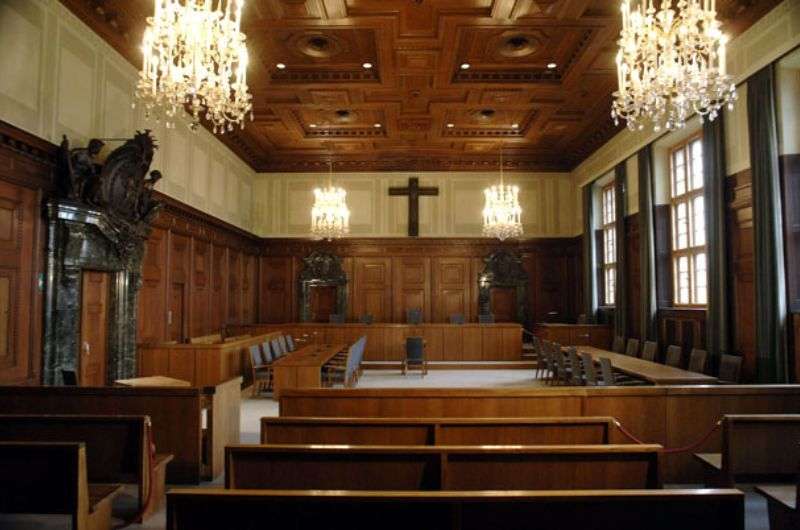
Courtroom 600
The Nuremberg Trials memorial is on the top floor of the Courthouse. The exhibition displays insights on the trials held there from 1946 to 1949 and provides details about the defendants and their horrific crimes.. It gives real context to how the court operated and what the outcomes meant for international law—Nuremberg Trials also gave rise to the establishment of Nuremberg Principles—the foundation for modern human rights law and war crimes prosecution.
It’s just a small museum, so you won’t need too long here, but if you value meaning over volume, it’s one of those places to see in Nuremberg that really sticks with you. Definitely worth including if you're planning your list of things to do in Nuremberg beyond the usual tourist spots.
11. Act like a kid at the Toy Museum (or not)
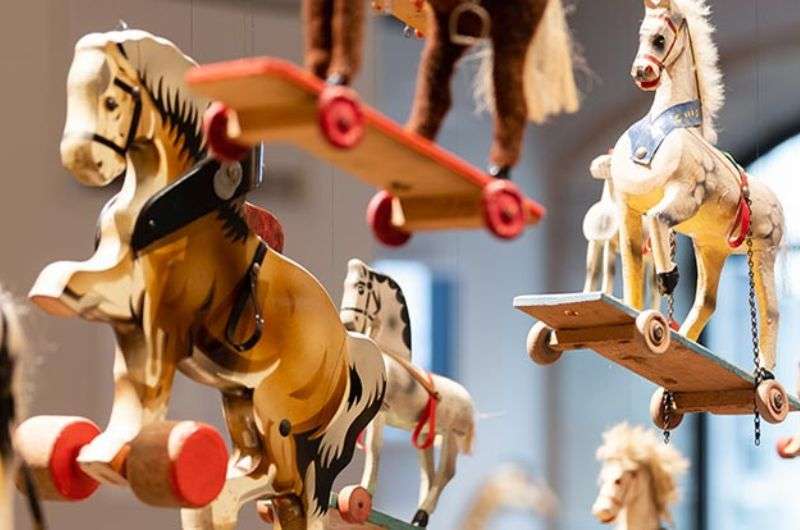
Toy Museum
- Opening Times:
- 10.00 am to 5.00 pm (Tuesday to Friday)
- 10.00 am to 6.00 pm (Saturday, Sunday and bank holidays)
- During the Christmas Market also Monday: 10.00 am to 5.00 pm
- Tickets:
- Adults: EUR 7.50, for an extra EUR 1 you can borrow an audio guide in English.
The Nuremberg Toy Museum is among the top tourst attractions in Nuremberg. Normally, I enjoy places I can act like a 6-year-old again, but this wasn't the case. I believe that it's a good choice when traveling with kids though.
Nuremberg has been a city of toys since the Middle Ages, producing toys for the whole of Europe, so it only makes sense that they decided to build the biggest toy museum there.
The Nuremberg Toy Museum was built in 1971 and it occupies three floors, where you can watch the evolution of toy making. There are more than 65,000 toys to see, from the old wooden and tin toys to models of railways, Barbie dolls and Playmobil. If you make it to the attic, you’ll find a kid’s playroom. If the weather is good, the kids can go crazy at the large outdoor playground, while you get the chance to refill some caffeine.
Hotels in Nuremberg: Best places to stay
In a rush you can walk the Altstadt of Nuremberg in one day, just admiring the architecture and the medieval atmosphere. However, I recommend at least two days to explore the museums as well. Where are the best places to stay?
Park Plaza Nuremberg: My personal recommendation
The Park Plaza Hotel has a perfect location within walking distance from the Aldstadt as well as the train station. Together with a contemporary design, wonderful stuff and a fitness center, it makes a perfect value for your money.
PrivatHotel Probst: Budget-friendly option near the train station
If you’re looking for cheap accommodation in Nuremberg, the PrivatHotel Probst is the best option. Inside the city walls and just a few minutes from the main train station, the hotel provides easy access to the Altstadt as well as the public transport connection. It’s simple but clean and it represents the perfect base for one-day trips around the city of Nuremberg.
Adina Apartment Hotel Nuremberg: Spa and fitness center in the Altstadt
If you’re craving a bit more luxury, check out the Adina Apartment Hotel. You can enjoy the hotel’s wellness and fitness as well as the breathtaking views of the city from the rooftop terrace. The hotel is also popular due to the fully equipped kitchen and the washing machine in the apartments.
My travel tips before you go to Nuremberg:
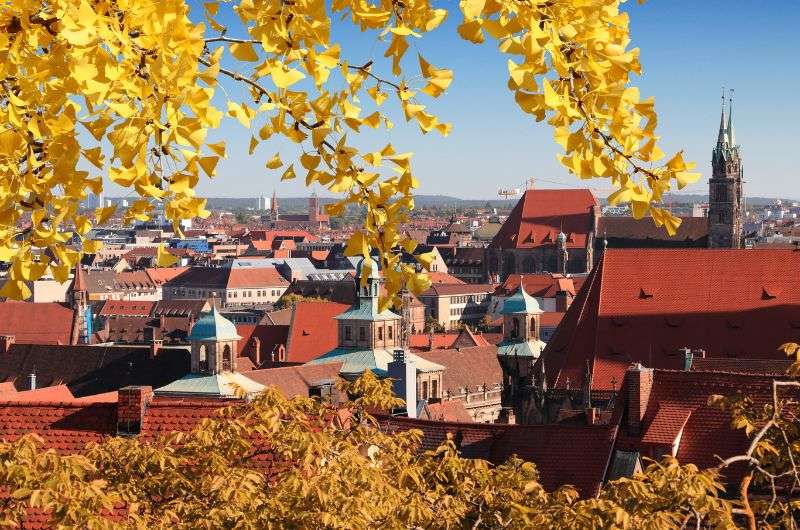
Nuremberg from above
-
Book a table in restaurants in advance, so you avoid long waiting.
-
Apart from Nazi-shaded history, Nuremberg is also famous for its Bratwurst—a traditional German sausage. In my opinion, the best restaurant to try is Bratwursthäusle near St. Sebald church, where you can enjoy the local specialties along with the Tucher beer straight from the tap.
-
Get a Nuremberg Card if you’re staying for two days or more. It costs 28 EUR (23.80 GBP/ 32.40 USD) but it’s well worth it as it includes all public transport for 2 days (that alone costs 18 EUR) and entry to most of the top city attractions (Imperial castle, Albrecht Dürer’s House, Documentation Centre and others).
-
Look out for the offbeat statues all around the city. Some of them are based on the Dürer’s designs and some of them have a quite recent touch. For example, the Ehekarussel depicts the stages of marriage from dating to…death.
-
Nuremberg is a perfect base for one-day trips to other Bavarian tourist destinations. Regensburg is just 1 hour by train, as well as Munich.


Put Nuremberg on your list—with so many great things to do, you won’t regret it
Sometimes, all you need to do is take the first step... I've filtered out the best hotels in Nuremberg for you
Save it for yourself to come back to later, or share with your friends on social media!
I've already planned your ititnerary for the trip, complete with my travel tips.
You might also be interested in reading:
This post contains affiliate links. If you make a booking through one of my links, I may earn a small commission—at no additional cost to you. Thank you for your support!





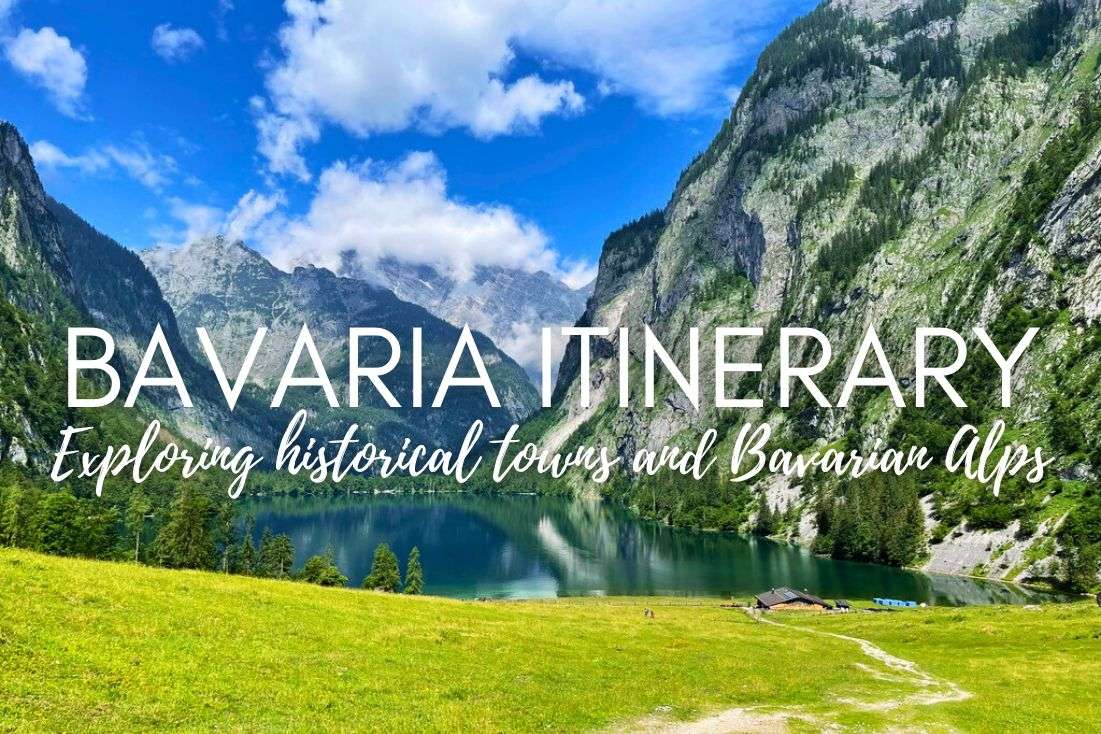
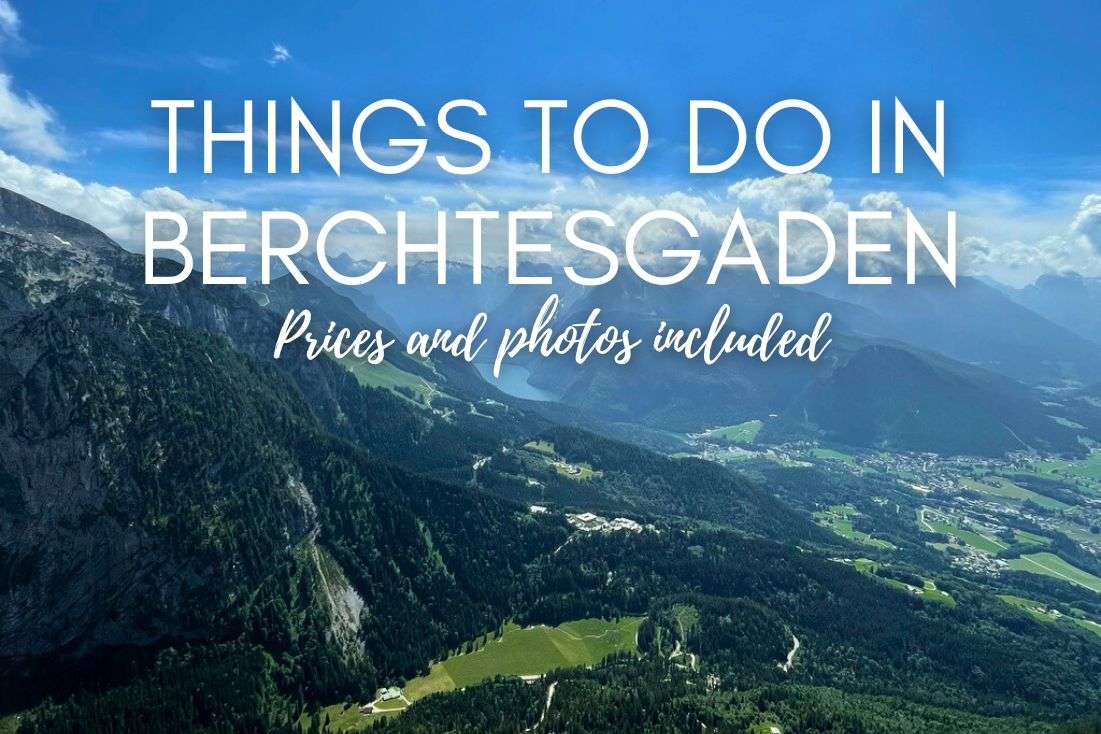



Comments | Thoughts? Give us a shout!